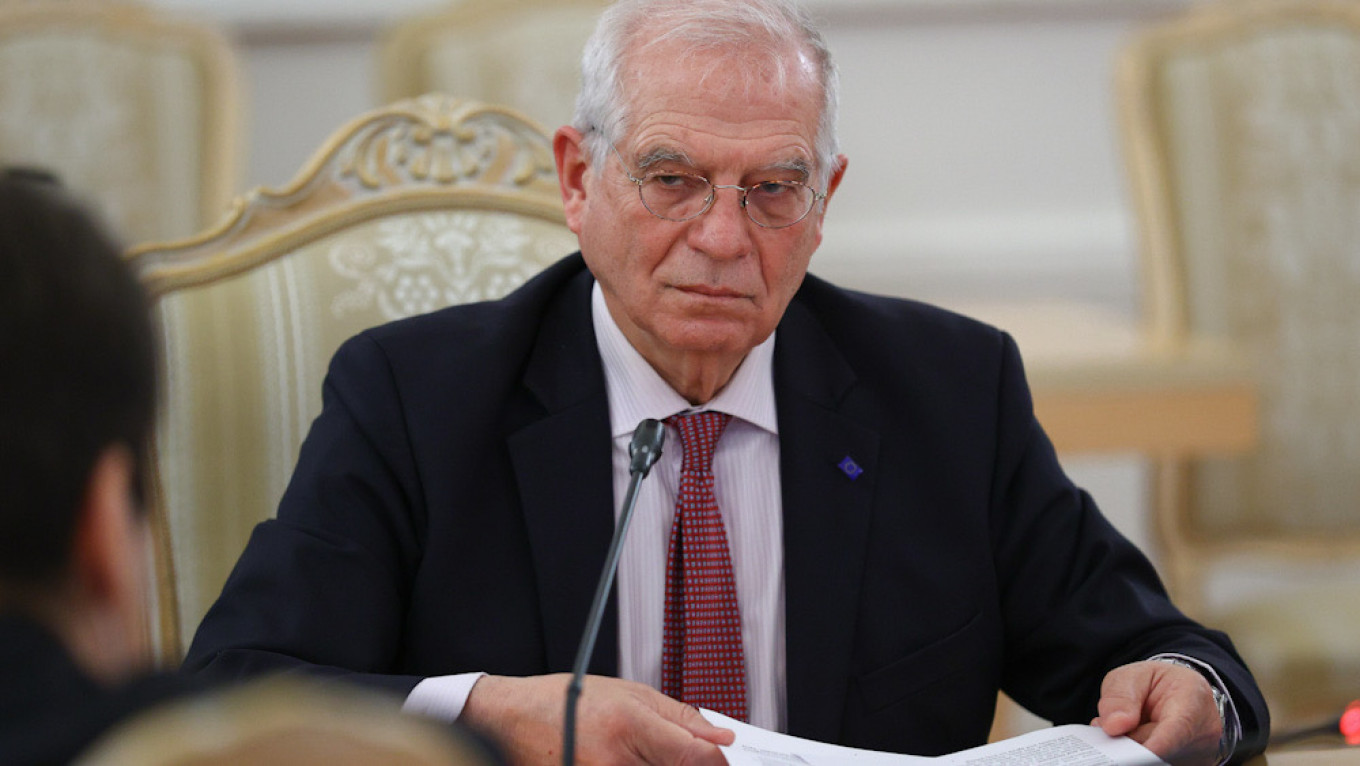
The European Union’s top diplomat Josep Borrell paid a three-day visit to Moscow for talks with Foreign Minister Sergei Lavrov, marking the first visit by a senior EU envoy to Russia since 2017.
Borrell’s decision to go ahead with the Moscow visit despite last week’s jailing of Kremlin critic Alexei Navalny and Russia’s harsh crackdown on pro-Navalny protesters had been a major point of controversy.
During the talks that began on Friday, Borrell and Lavrov discussed various points of disagreement and cooperation between the EU and Russia — but hours later, Russia announced the expulsion of several European diplomats, undermining Borrell’s entire visit.
Here’s a look at what took place — and what may come next for Russia-EU diplomacy:
On Navalny
Borrell called for Navalny’s immediate release and an investigation into his near-fatal poisoning in August that saw him evacuated to Germany in a coma. European scientists and the global chemical weapons watchdog determined that Navalny had been poisoned with Novichok, a military-grade nerve agent developed by the Soviet Union, while the Kremlin says it has no evidence of his poisonng.
Borrell’s visit came as EU members weighed new sanctions against Russia over Navalny’s sentencing last week to nearly three years in prison over alleged probation violations during his recovery in Germany. The EU’s top diplomat declined to visit Navalny in prison, however, which critics said undermined the seriousness of his jailing.
“Our relationship is indeed in a difficult moment under severe strain and the Navalny case is a low point,” Borrell said.
Borrell also condemned the detentions of over 10,000 people across the country and the brutal beatings of peaceful protesters at pro-Navalny protests that have rocked Russia in recent weeks.
Sputnik V
Borrell lauded Russia’s coronavirus vaccine, saying he hopes EU regulators will approve it in the near future as Moscow applied for EU approval last month.
Ahead of his visit, peer-reviewed research published in The Lancet showed the Sputnik V vaccine to be 91.6% effective against symptomatic cases of Covid-19, boosting international confidence.
“It’s good news for the whole of mankind because it means we will have more tools to fight the pandemic,” Borrell said.
Critics accused Brussels of handing the Kremlin a propaganda win by botching its own vaccine rollout, thus needing to resort to Sputnik V. Due to Europe’s vaccine shortage, Hungary was the first EU country to approve Sputnik V and purchase about 2 million doses of the vaccine, about 40,000 of which have already been administered.
Points of cooperation
Despite their differences, the senior diplomats agreed that Russia and the EU must work together on key issues such as reviving the Iran nuclear deal and tackling climate change.
“There are issues in which we can and must work together,” Borrell told reporters at a joint press conference with Lavrov, who said that “both sides have confirmed their interest in maintaining and expanding channels of dialogue, including on issues on which our positions differ.”
Diplomat expulsion
Just hours after Borrell met with Lavrov, however, Moscow announced it was expelling several European diplomats for allegedly attending the recent pro-Navalny protests.
According to the Russian Foreign Ministry, the diplomats from Poland, Germany and Sweden had attended the Jan. 23 protests in Moscow and St. Petersburg which hadn’t been authorized by the authorities.
“Such actions on their part are unacceptable and do not correspond to their diplomatic status,” the Foreign Ministry said in a statement.
European leaders swiftly criticized Moscow’s move.
“The expulsion of three EU diplomats during my visit indicates that the Russian authorities did not want to seize this opportunity to have a more constructive dialogue with the EU,” Borrell said in a blog post.
Aftermath
“My meeting with Minister Lavrov and the messages sent by Russian authorities during my visit confirmed that Europe and Russia are drifting apart,” Borrell said in a blog post Sunday night.
He concluded that Europe must “draw consequences” after Russia rejected the EU’s attempts at constructive dialogue.
“It will be for member states to decide the next steps, and yes, these could include sanctions,” Borrell said.
Borrell will debrief his trip to foreign ministers from the EU’s 27 member states on Feb. 22 and the bloc’s leaders will discuss strained ties with Moscow at a summit in March.
Includes reporting from AFP.
